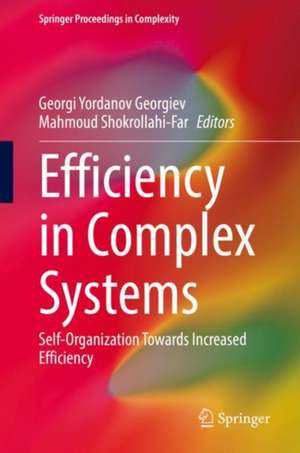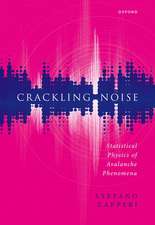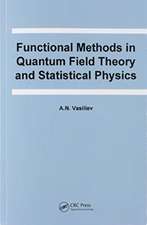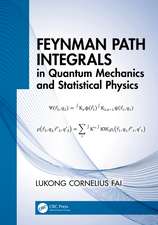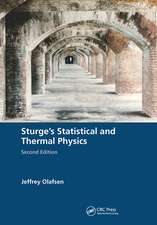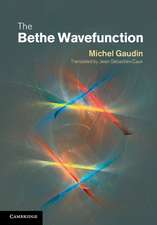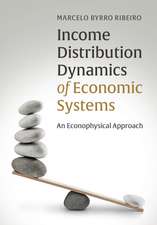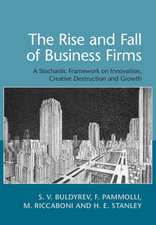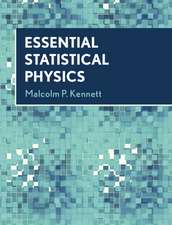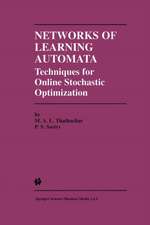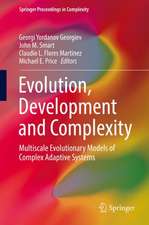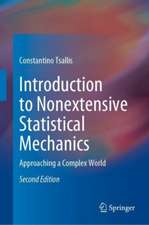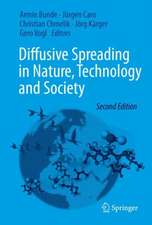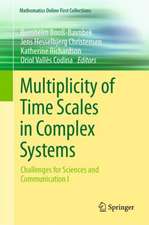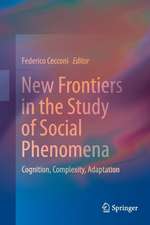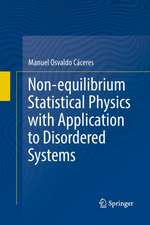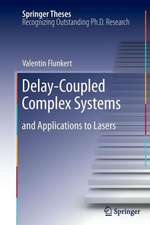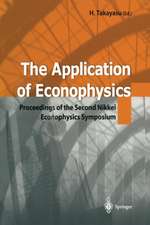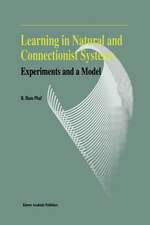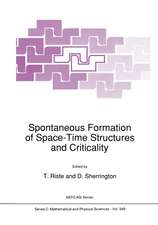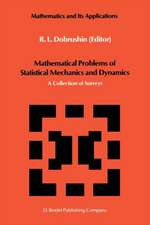Efficiency in Complex Systems: Self-Organization Towards Increased Efficiency: Springer Proceedings in Complexity
Editat de Georgi Yordanov Georgiev, Mahmoud Shokrollahi-Faren Limba Engleză Hardback – 25 feb 2022
The chapters come from a satellite meeting hosted at the Conference on Complex Systems, in Cancun, 2017. The contributions will be peer-reviewed and contributors from outside the conference will be invited to submit chapters to ensure full coverage of the topics. This text will appeal to students and researchers working on complex systems and efficiency.
| Toate formatele și edițiile | Preț | Express |
|---|---|---|
| Paperback (1) | 1210.93 lei 6-8 săpt. | |
| Springer International Publishing – 26 feb 2023 | 1210.93 lei 6-8 săpt. | |
| Hardback (1) | 1216.78 lei 6-8 săpt. | |
| Springer International Publishing – 25 feb 2022 | 1216.78 lei 6-8 săpt. |
Din seria Springer Proceedings in Complexity
- 20%
 Preț: 1128.80 lei
Preț: 1128.80 lei - 18%
 Preț: 1240.16 lei
Preț: 1240.16 lei - 18%
 Preț: 1214.09 lei
Preț: 1214.09 lei -
 Preț: 497.13 lei
Preț: 497.13 lei - 18%
 Preț: 1112.30 lei
Preț: 1112.30 lei - 18%
 Preț: 1300.10 lei
Preț: 1300.10 lei - 20%
 Preț: 1084.83 lei
Preț: 1084.83 lei - 18%
 Preț: 1393.27 lei
Preț: 1393.27 lei - 18%
 Preț: 961.55 lei
Preț: 961.55 lei - 20%
 Preț: 646.95 lei
Preț: 646.95 lei - 15%
 Preț: 641.71 lei
Preț: 641.71 lei - 18%
 Preț: 1395.32 lei
Preț: 1395.32 lei - 18%
 Preț: 952.89 lei
Preț: 952.89 lei - 20%
 Preț: 646.12 lei
Preț: 646.12 lei - 20%
 Preț: 571.27 lei
Preț: 571.27 lei - 20%
 Preț: 1288.76 lei
Preț: 1288.76 lei - 18%
 Preț: 1125.55 lei
Preț: 1125.55 lei - 15%
 Preț: 643.34 lei
Preț: 643.34 lei - 18%
 Preț: 947.04 lei
Preț: 947.04 lei - 24%
 Preț: 839.38 lei
Preț: 839.38 lei - 18%
 Preț: 1251.98 lei
Preț: 1251.98 lei - 18%
 Preț: 1670.11 lei
Preț: 1670.11 lei - 18%
 Preț: 1223.25 lei
Preț: 1223.25 lei - 18%
 Preț: 974.04 lei
Preț: 974.04 lei - 15%
 Preț: 646.11 lei
Preț: 646.11 lei - 18%
 Preț: 1225.16 lei
Preț: 1225.16 lei - 15%
 Preț: 645.79 lei
Preț: 645.79 lei - 18%
 Preț: 957.32 lei
Preț: 957.32 lei - 20%
 Preț: 984.18 lei
Preț: 984.18 lei - 15%
 Preț: 643.84 lei
Preț: 643.84 lei - 15%
 Preț: 644.63 lei
Preț: 644.63 lei - 18%
 Preț: 1236.51 lei
Preț: 1236.51 lei - 18%
 Preț: 1223.25 lei
Preț: 1223.25 lei - 18%
 Preț: 964.86 lei
Preț: 964.86 lei - 18%
 Preț: 1278.82 lei
Preț: 1278.82 lei - 18%
 Preț: 1217.41 lei
Preț: 1217.41 lei - 24%
 Preț: 1067.23 lei
Preț: 1067.23 lei -
 Preț: 424.99 lei
Preț: 424.99 lei - 18%
 Preț: 1236.69 lei
Preț: 1236.69 lei - 20%
 Preț: 1277.57 lei
Preț: 1277.57 lei -
 Preț: 424.81 lei
Preț: 424.81 lei - 24%
 Preț: 1084.90 lei
Preț: 1084.90 lei
Preț: 1216.78 lei
Preț vechi: 1483.88 lei
-18% Nou
Puncte Express: 1825
Preț estimativ în valută:
232.85€ • 241.63$ • 194.63£
232.85€ • 241.63$ • 194.63£
Carte tipărită la comandă
Livrare economică 15-29 martie
Preluare comenzi: 021 569.72.76
Specificații
ISBN-13: 9783030692872
ISBN-10: 3030692876
Pagini: 157
Ilustrații: XI, 157 p. 12 illus., 5 illus. in color.
Dimensiuni: 155 x 235 mm
Greutate: 0.42 kg
Ediția:1st ed. 2022
Editura: Springer International Publishing
Colecția Springer
Seria Springer Proceedings in Complexity
Locul publicării:Cham, Switzerland
ISBN-10: 3030692876
Pagini: 157
Ilustrații: XI, 157 p. 12 illus., 5 illus. in color.
Dimensiuni: 155 x 235 mm
Greutate: 0.42 kg
Ediția:1st ed. 2022
Editura: Springer International Publishing
Colecția Springer
Seria Springer Proceedings in Complexity
Locul publicării:Cham, Switzerland
Cuprins
Increasing of efficiency of cities in self-organization and evolution.- Efficiency of Grammars for Natural Languages.- The constructual law and efficiency in self-organization.- A focus on the contrast between ‘operators’ and ‘interaction systems’ when analysing flows and efficiency.- On the origin of universal patterns.- Efficiency as an attractor in self-organization.- Mobin Grammar: Unique Computational Efficiency.- Efficiency of Energy Transfer in Rayleigh-Benard Convection.- Complexity as a manifestation of symmetry breaking in self-organizing systems.- New Approaches of Analyzing Efficiency and Size Trends in Evolving Computer Architecture.
Notă biografică
Arto Annila is a former professor of biophysics at the University of Helsinki, Finland. He has applied statistical physics of open quantized systems in making sense of processes from chemical reactions to the evolution of biota and from small purchases to the world trade and from elementary particle transformations to the evolution of the universe as summarized in the recent book: Back to Reality: A Revision of the Scientific Worldview (2020).
Gerard Jagers op Akkerhuis is an evolution scientist with a transdisciplinary interest. He is the architect of the Operator theory, which connects physical and biological evolution. He holds a PhD in ecology (Wageningen University) and one in mathematics, physics and information science (Radboud University Nijmegen). He has been working as a (guest-)scientist and/or team leader at the Free University Amsterdam, at the National Environmental Research Center (NERI) in Denmark and at Alterra, Wageningen University. He has (co-)authored more than 100 publications.
Georgi Yordanov Georgiev is a Professor of Physics at Assumption University and Worcester
Polytechnic Institute, Worcester, MA, and is affiliated with Tufts University, Boston, MA. His interests are in applying first principles from physics to explain the continuous self-organization and evolution in complex systems very far away from thermodynamic equilibrium. His approach is to use
variational principles as drivers for progressive development of structure in those
systems. He has proposed to use the efficiency of physical action as a measure for
the degree of organization.
Relja Vulanovic is a full professor at Department of Mathematical Sciences, Kent State University at Stark, USA, with the research interests in Mathematical Linguistics, Singular Perturbations, and Numerical Analysis. Some of his publications in mathematical linguistics are Grammar efficiency and Complexity (2003), On Measuring Language Complexity as Relative to the Conveyed Linguistic Information (2007), A Mathematical Analysis of Parts-of-Speech Systems (2008), and Word Order, Marking, and Parts-of-Speech Systems (2009).
Jawad Faiz is a full professor at Faculty of Electrical and Computer Engineering, Tehran University, and Director of Center of Excellence on Applied Electromagnetic Systems, Iran, as well as member of Iran Academy of Sciences. His teaching and research interests include switched reluctance and variable reluctance motor design, design and modeling of electrical machines and drives, transformer modeling and design, and fault diagnosis in electrical machinery. As a Senior Member of IEEE he is editorial member of many journals and has authored 270 articles in international journals together with 280 articles in international conference proceedings.
Mahmoud Shokrollahi-Far is an adjunct computational/mathematical linguist at Department of Cognitive Science and Artificial Intelligence, Tilburg University, and has newly founded MOBINICA Foundation, High Tech Campus Eindhoven, the Netherlands. When in Iran, he lectures at departments of Linguistics and Artificial Intelligence, University College Nabi-Akram. The research approach in his main publications is developing highly efficient formal models on natural languages with high grammatical complexity applicable to computationally model other highly complex natural systems.
Predrag T. Tosic is an independent researcher in AI, Data Science and Discrete Complex Systems, and an Adjunct Research Faculty at Washington State University in Pullman, Washington, USA. He holds PhD in Computer Science from University of Illinois (UIUC; 2006) and is also an 'ABD' in Mathematics. Dr. Tosic has held various teaching positions in recent years, and is currently teaching undergraduate Computer Science classes at Eastern Washington University. His research interests include AI, multi-agent systems, agent-based modeling of complex distributed infrastructures, discrete-time / discrete-space dynamical systems, machine learning, foundations as well as applications of data science, and computational game theory. As of the early 2021, Dr. Tosic has published about 85 peer-reviewed research papers in these areas. He finds it particularly intellectually stimulating to discuss large-scale complex systems with researchers from different scientific disciplines, from physics and biology to economics to social sciences.
Gerard Jagers op Akkerhuis is an evolution scientist with a transdisciplinary interest. He is the architect of the Operator theory, which connects physical and biological evolution. He holds a PhD in ecology (Wageningen University) and one in mathematics, physics and information science (Radboud University Nijmegen). He has been working as a (guest-)scientist and/or team leader at the Free University Amsterdam, at the National Environmental Research Center (NERI) in Denmark and at Alterra, Wageningen University. He has (co-)authored more than 100 publications.
Georgi Yordanov Georgiev is a Professor of Physics at Assumption University and Worcester
Polytechnic Institute, Worcester, MA, and is affiliated with Tufts University, Boston, MA. His interests are in applying first principles from physics to explain the continuous self-organization and evolution in complex systems very far away from thermodynamic equilibrium. His approach is to use
variational principles as drivers for progressive development of structure in those
systems. He has proposed to use the efficiency of physical action as a measure for
the degree of organization.
Relja Vulanovic is a full professor at Department of Mathematical Sciences, Kent State University at Stark, USA, with the research interests in Mathematical Linguistics, Singular Perturbations, and Numerical Analysis. Some of his publications in mathematical linguistics are Grammar efficiency and Complexity (2003), On Measuring Language Complexity as Relative to the Conveyed Linguistic Information (2007), A Mathematical Analysis of Parts-of-Speech Systems (2008), and Word Order, Marking, and Parts-of-Speech Systems (2009).
Jawad Faiz is a full professor at Faculty of Electrical and Computer Engineering, Tehran University, and Director of Center of Excellence on Applied Electromagnetic Systems, Iran, as well as member of Iran Academy of Sciences. His teaching and research interests include switched reluctance and variable reluctance motor design, design and modeling of electrical machines and drives, transformer modeling and design, and fault diagnosis in electrical machinery. As a Senior Member of IEEE he is editorial member of many journals and has authored 270 articles in international journals together with 280 articles in international conference proceedings.
Mahmoud Shokrollahi-Far is an adjunct computational/mathematical linguist at Department of Cognitive Science and Artificial Intelligence, Tilburg University, and has newly founded MOBINICA Foundation, High Tech Campus Eindhoven, the Netherlands. When in Iran, he lectures at departments of Linguistics and Artificial Intelligence, University College Nabi-Akram. The research approach in his main publications is developing highly efficient formal models on natural languages with high grammatical complexity applicable to computationally model other highly complex natural systems.
Predrag T. Tosic is an independent researcher in AI, Data Science and Discrete Complex Systems, and an Adjunct Research Faculty at Washington State University in Pullman, Washington, USA. He holds PhD in Computer Science from University of Illinois (UIUC; 2006) and is also an 'ABD' in Mathematics. Dr. Tosic has held various teaching positions in recent years, and is currently teaching undergraduate Computer Science classes at Eastern Washington University. His research interests include AI, multi-agent systems, agent-based modeling of complex distributed infrastructures, discrete-time / discrete-space dynamical systems, machine learning, foundations as well as applications of data science, and computational game theory. As of the early 2021, Dr. Tosic has published about 85 peer-reviewed research papers in these areas. He finds it particularly intellectually stimulating to discuss large-scale complex systems with researchers from different scientific disciplines, from physics and biology to economics to social sciences.
Textul de pe ultima copertă
This book uses new ideas and language for understanding how self-organization and complexity trend toward increased efficiency. Different measures for efficiency from multiple disciplines are used to probe the ones that provide the most insight. One major goal is to seek a common framework to trace the increase of efficiency as a measure of the level of organization and evolutionary stage of a complex system.
The chapters come from a satellite meeting hosted at the Conference on Complex Systems, in Cancun, 2017. The contributions will be peer-reviewed and contributors from outside the conference will be invited to submit chapters to ensure full coverage of the topics. This text will appeal to students and researchers working on complex systems and efficiency.
The chapters come from a satellite meeting hosted at the Conference on Complex Systems, in Cancun, 2017. The contributions will be peer-reviewed and contributors from outside the conference will be invited to submit chapters to ensure full coverage of the topics. This text will appeal to students and researchers working on complex systems and efficiency.
